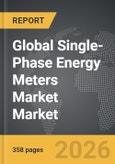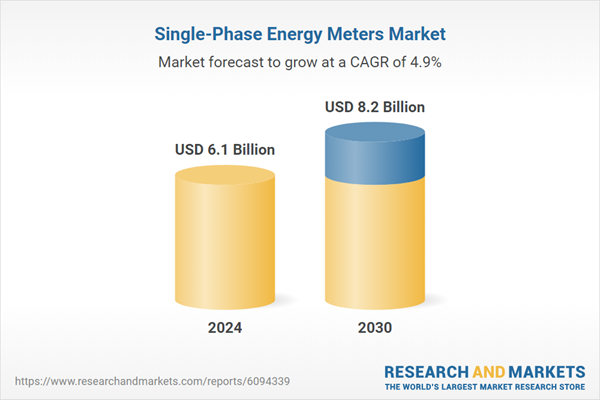Global 'Single-Phase Energy Meters' Market - Key Trends & Drivers Summarized
Why Are Single-Phase Energy Meters Crucial In Evolving Power Distribution Landscapes?
Single-phase energy meters have become essential instruments in residential and small commercial electricity monitoring as power distribution networks evolve toward smarter, more decentralized frameworks. These meters are designed to measure electricity consumption in single-phase systems - typically found in households and low-load environments - and are the primary interface between consumers and utility providers. With the global surge in electrification, particularly in rural and developing regions, single-phase meters serve as the backbone of billing accuracy, load profiling, and energy auditing. Their growing importance is tied to the digital transformation of power grids, as utilities seek greater transparency, accountability, and efficiency in energy usage. Smart versions of these meters support real-time monitoring, remote communication, and load control, aligning well with modern grid strategies like time-of-use pricing and demand response. As utilities transition from analog to smart metering infrastructure, single-phase smart meters are often the first phase of implementation, enabling gradual grid modernization. These devices are also instrumental in integrating distributed energy resources (DERs) like rooftop solar and electric vehicles into the grid, by accurately tracking bidirectional energy flows. In urban centers, the rollout of smart meters is accelerating due to regulatory mandates, whereas in off-grid and microgrid scenarios, compact, prepayment-enabled meters are key enablers of energy access and control. Their reliability, affordability, and scalability make them indispensable tools in global energy transition strategies.How Are Technological Advances Enhancing The Functionality And Intelligence Of These Meters?
Technological innovation is reshaping single-phase energy meters from simple kWh counters to intelligent nodes in smart grid ecosystems. Modern meters now integrate features such as advanced metering infrastructure (AMI), built-in communication modules (RF, NB-IoT, LTE-M), and real-time data analytics capabilities. These features enable utilities to perform remote meter reading, fault detection, load analysis, and outage localization - reducing operational costs and improving service quality. The latest meters support multi-rate billing, power quality monitoring (including voltage sags and harmonic distortions), and tamper detection, making them far more versatile than their legacy counterparts. Many single-phase meters now come with embedded storage and processing power, allowing local data caching, edge analytics, and interoperability with energy management systems. Modular hardware design enables future upgrades and retrofitting, while firmware-over-the-air (FOTA) updates keep meters current without physical intervention. The use of secure embedded operating systems and encryption protocols ensures data privacy and cybersecurity compliance, which is critical as meters become part of broader IoT ecosystems. Interoperability standards like DLMS/COSEM and compliance with IEC 62052 and 62053 standards have enabled wider adoption by ensuring cross-compatibility across vendors and regions. These advancements are not only enhancing meter performance but also making them key enablers of grid intelligence, demand-side management, and decentralized energy operations.What Consumer Trends And Regulatory Pressures Are Shaping Market Adoption?
The global adoption of single-phase energy meters is being shaped by a confluence of consumer expectations, utility modernization goals, and evolving regulatory frameworks. On the consumer front, rising electricity costs are driving demand for transparent, granular, and real-time consumption data that single-phase smart meters readily provide. Prosumers - households generating their own power through rooftop solar - require meters that support net metering and bidirectional energy flow tracking. Consumers are also increasingly interested in integrating these meters with home energy management systems (HEMS), smart appliances, and mobile apps to actively monitor and optimize their energy usage. From a regulatory standpoint, governments are mandating smart meter rollouts to improve billing accuracy, reduce non-technical losses, and support energy efficiency targets. In the EU, Asia-Pacific, and parts of North America, legislation is pushing for nationwide smart meter deployment, with many countries setting ambitious penetration targets for single-phase units. Utilities, in turn, are using these mandates to enhance grid visibility, forecast demand more accurately, and reduce manual field operations. In emerging markets, prepayment-enabled single-phase meters are being used to address energy theft, improve revenue collection, and expand access to electricity in underserved regions. Environmental and social governance (ESG) pressures are also prompting utilities to deploy smart meters as a step toward digital decarbonization. The convergence of consumer engagement, grid modernization, and policy alignment is creating a powerful tailwind for the single-phase energy meter market.What Factors Are Driving The Accelerated Growth Of The Single-Phase Energy Meter Market?
The growth in the single-phase energy meter market is driven by several specific, interrelated factors across technology, end-use trends, and infrastructure strategies. First, the global shift toward smart grids and digital utilities is catalyzing large-scale replacement of analog meters with intelligent single-phase smart meters that enable automated metering, remote disconnection, and data-driven decision-making. Second, the proliferation of rooftop solar, home energy storage, and electric vehicles in residential settings requires meters capable of tracking bidirectional energy flows and dynamic load profiles. Third, urbanization and rising energy demand in developing nations are creating a massive need for low-cost, scalable, and reliable metering infrastructure - a role ideally suited to single-phase meters. Fourth, increased regulatory mandates and government-backed deployment programs in markets like India, China, Brazil, and the EU are accelerating procurement and installation of these devices. Fifth, utility cost pressures are driving operational efficiency efforts, where smart metering cuts manual labor, fraud, and energy losses. Sixth, innovations in connectivity - including cellular IoT and LPWAN - are enabling remote monitoring in even the most rural and hard-to-reach locations. Lastly, ESG-driven investment in grid modernization is funneling funds into digital metering programs, making it easier for utilities to access capital for rollouts. These combined forces - grounded in practical applications and market-specific dynamics - are powering robust global growth in the single-phase energy meter market, making it a cornerstone of 21st-century energy infrastructure.Report Scope
The report analyzes the Single-Phase Energy Meters market, presented in terms of market value (US$). The analysis covers the key segments and geographic regions outlined below:- Segments: Meter Type (Digital Meters, Analog Meters); Application (Factories, Household Appliance); End-Use (Domestic, Industrial).
- Geographic Regions/Countries: World; United States; Canada; Japan; China; Europe (France; Germany; Italy; United Kingdom; Spain; Russia; and Rest of Europe); Asia-Pacific (Australia; India; South Korea; and Rest of Asia-Pacific); Latin America (Argentina; Brazil; Mexico; and Rest of Latin America); Middle East (Iran; Israel; Saudi Arabia; United Arab Emirates; and Rest of Middle East); and Africa.
Key Insights:
- Market Growth: Understand the significant growth trajectory of the Digital Meters segment, which is expected to reach US$5.4 Billion by 2030 with a CAGR of a 5.8%. The Analog Meters segment is also set to grow at 3.4% CAGR over the analysis period.
- Regional Analysis: Gain insights into the U.S. market, valued at $1.7 Billion in 2024, and China, forecasted to grow at an impressive 9.1% CAGR to reach $1.7 Billion by 2030. Discover growth trends in other key regions, including Japan, Canada, Germany, and the Asia-Pacific.
Why You Should Buy This Report:
- Detailed Market Analysis: Access a thorough analysis of the Global Single-Phase Energy Meters Market, covering all major geographic regions and market segments.
- Competitive Insights: Get an overview of the competitive landscape, including the market presence of major players across different geographies.
- Future Trends and Drivers: Understand the key trends and drivers shaping the future of the Global Single-Phase Energy Meters Market.
- Actionable Insights: Benefit from actionable insights that can help you identify new revenue opportunities and make strategic business decisions.
Key Questions Answered:
- How is the Global Single-Phase Energy Meters Market expected to evolve by 2030?
- What are the main drivers and restraints affecting the market?
- Which market segments will grow the most over the forecast period?
- How will market shares for different regions and segments change by 2030?
- Who are the leading players in the market, and what are their prospects?
Report Features:
- Comprehensive Market Data: Independent analysis of annual sales and market forecasts in US$ Million from 2024 to 2030.
- In-Depth Regional Analysis: Detailed insights into key markets, including the U.S., China, Japan, Canada, Europe, Asia-Pacific, Latin America, Middle East, and Africa.
- Company Profiles: Coverage of players such as AEconversion GmbH & Co. KG, Altenergy Power System Inc. (APsystems), Beny New Energy, Chilicon Power LLC, Darfon Electronics Corp. and more.
- Complimentary Updates: Receive free report updates for one year to keep you informed of the latest market developments.
Some of the 34 companies featured in this Single-Phase Energy Meters market report include:
- ABB Ltd.
- Aclara Technologies LLC
- Circutor S.A.
- Eastron Electronic Co., Ltd.
- Elster Group GmbH
- Genus Power Infrastructures Ltd.
- Holley Technology Ltd.
- Honeywell International Inc.
- Itron Inc.
- Jiangsu Linyang Electronics Co., Ltd.
- Kamstrup A/S
- Landis+Gyr
- Larsen & Toubro Limited
- Schneider Electric SE
- Secure Meters Limited
- Sensus (Xylem Inc.)
- Siemens AG
- Wasion Group Holdings Limited
- Yokogawa Electric Corporation
- ZIV Automation
This edition integrates the latest global trade and economic shifts into comprehensive market analysis. Key updates include:
- Tariff and Trade Impact: Insights into global tariff negotiations across 180+ countries, with analysis of supply chain turbulence, sourcing disruptions, and geographic realignment. Special focus on 2025 as a pivotal year for trade tensions, including updated perspectives on the Trump-era tariffs.
- Adjusted Forecasts and Analytics: Revised global and regional market forecasts through 2030, incorporating tariff effects, economic uncertainty, and structural changes in globalization. Includes historical analysis from 2015 to 2023.
- Strategic Market Dynamics: Evaluation of revised market prospects, regional outlooks, and key economic indicators such as population and urbanization trends.
- Innovation & Technology Trends: Latest developments in product and process innovation, emerging technologies, and key industry drivers shaping the competitive landscape.
- Competitive Intelligence: Updated global market share estimates for 2025, competitive positioning of major players (Strong/Active/Niche/Trivial), and refined focus on leading global brands and core players.
- Expert Insight & Commentary: Strategic analysis from economists, trade experts, and domain specialists to contextualize market shifts and identify emerging opportunities.
Table of Contents
Companies Mentioned (Partial List)
A selection of companies mentioned in this report includes, but is not limited to:
- ABB Ltd.
- Aclara Technologies LLC
- Circutor S.A.
- Eastron Electronic Co., Ltd.
- Elster Group GmbH
- Genus Power Infrastructures Ltd.
- Holley Technology Ltd.
- Honeywell International Inc.
- Itron Inc.
- Jiangsu Linyang Electronics Co., Ltd.
- Kamstrup A/S
- Landis+Gyr
- Larsen & Toubro Limited
- Schneider Electric SE
- Secure Meters Limited
- Sensus (Xylem Inc.)
- Siemens AG
- Wasion Group Holdings Limited
- Yokogawa Electric Corporation
- ZIV Automation
Table Information
| Report Attribute | Details |
|---|---|
| No. of Pages | 358 |
| Published | February 2026 |
| Forecast Period | 2024 - 2030 |
| Estimated Market Value ( USD | $ 6.1 Billion |
| Forecasted Market Value ( USD | $ 8.2 Billion |
| Compound Annual Growth Rate | 4.9% |
| Regions Covered | Global |









